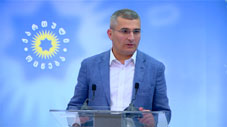
Mdinaradze Responds to Borrell, Denounces EU Accusations
By Liza Mchedlidze
Wednesday, June 26, 2024
The leader of the majority, Mamuka Mdinaradze, has strongly criticized the European Union following a statement by Josep Borrell, the EU's High Representative for Foreign Affairs and Security Policy. Mdinaradze denounced the accusations leveled against Georgia, warning against the imposition of "unjust" sanctions on the country.
"It is inconceivable that Georgia should be accused of something it did not commit. It is inconceivable that our country should be sanctioned because of the accused case. I hope that the representatives of the EU bureaucracy, who treated their citizens like 'Nazis', will not treat Georgia like this," Mdinaradze said in his response to Borrell's statement.
Mdinaradze emphasized that if the European Union bureaucracy wrongly accuses Georgia and its government, sanctions may become a recurring issue. He insisted that the core problem lies in the baseless accusations rather than the sanctions themselves.
"I hope that the representatives of the EU's top bureaucracy, like the Nazis treated their citizens, will not treat Georgia like that. Innocent people were accused and punished. If the same thing happens again today, but on a larger scale, that is, if the EU bureaucracy wrongly accuses Georgia and its government of something - the Russianness of this law, the decline of democracy due to this law - then sanctions may become commonplace. But the problem is in the blame, not in the sanctions," Mdinaradze asserted.
He further argued that it is impossible for high-ranking officials in the European Union to not recognize that laws modeled after those in Canada, France, and the United States cannot be deemed "Russian" simply because they are implemented in Georgia.
"It is impossible for high-ranking officials in the European Union not to know that what is Canadian in Canada cannot be Russian in Georgia, what is French in France cannot be Russian in Georgia, what has been American in America for decades cannot be Russian in Georgia," Mdinaradze said.
Mdinaradze's comments came in response to Borrell's assertion that due to the adoption of the "Russian law", political contacts with the Georgian authorities will be reduced, support for the government will be frozen, and European credit financing lines will be revised. Borrell stated that these measures can be taken immediately.
Mdinaradze stated he does not expect sanctions to be imposed on Georgia or any high-ranking officials based on "unfounded accusations". He criticized the shifting narratives around possible sanctions and visa liberalization, suggesting they are inconsistent and lack basis in reality.
"For a while, they talked about visa liberalization, but then they realized that this story did not fit in PR. Yesterday they said that candidate status was granted to the people; now it is no longer possible to punish the people and now we should punish the high-ranking officials. Therefore, if you accuse, then you will be punished. We do not expect Georgia or any high-ranking official to be punished," Mdinaradze concluded.

